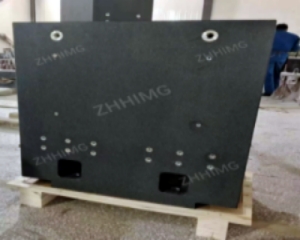Precision granite components:
The density ranges from 2.79 to 3.07g/cm³ (the exact value may vary depending on the type of granite and the place of origin). This density range makes the granite components have a certain stability in weight and are not easy to move or deform due to external forces.
Precision ceramic components:
The density varies depending on the specific composition of the ceramic and the manufacturing process. In general, the density of high-precision ceramics may be high, such as the density of some wear-resistant precision ceramic parts can reach 3.6g/cm³, or even higher. However, some ceramic materials are designed to have lower densities for specific applications, such as lightweight.
Impact on applications
1. Load-bearing and stability:
Higher density usually means better load-bearing capacity and stability. Therefore, in the need to bear a large weight or maintain high precision occasions (such as machine tool base, measuring platform, etc.), higher density precision granite components may be more suitable.
Although the density of precision ceramic components may be higher, its specific application also needs to consider other factors (such as hardness, wear resistance, etc.) and the overall design needs.
2. Lightweight requirements:
In some applications, such as aerospace, there are high requirements for lightweight materials. At this time, although precision ceramics are excellent in some aspects, their higher density may limit their application in these areas. On the contrary, by optimizing the design and material selection, the weight of precision ceramic components can be reduced to a certain extent to meet specific needs.
3. Processing and cost:
Materials with higher density may require greater cutting forces and longer processing times during processing, thus increasing processing costs. Therefore, in the selection of materials, in addition to considering its performance, it is also necessary to consider the processing difficulty and cost factors.
4. Application field:
Because of its good stability and load-bearing capacity, precision granite components are widely used in precision measurement, optical instruments, geological exploration and other fields.
Precision ceramic components have unique advantages in aerospace, energy, chemical and other high-tech fields because of their excellent high temperature resistance, wear resistance, high strength and other characteristics.
In summary, there are differences in density between precision granite components and precision ceramic components, and this difference affects their application fields and specific ways of use to a certain extent. In practical applications, appropriate materials should be selected according to specific needs and conditions to achieve the best performance and economic benefits.
Post time: Aug-05-2024

